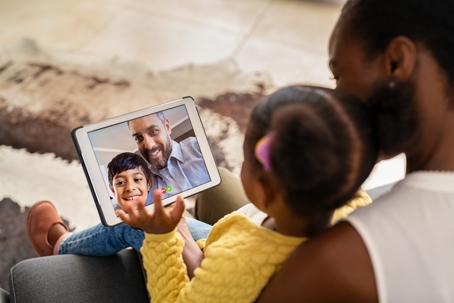Technology is playing a bigger role than ever in divorce and child custody cases, shaping how information is shared, managed, and even argued in court. From gathering digital evidence to using online tools for co-parenting, understanding the effect of technology is crucial for navigating these complex situations. This blog explores the impact of technological advancements and offers insights to help you make informed decisions as you manage family law disputes.
The Role of Technology in Modern Divorce Proceedings
Digital Communication and Evidence Gathering
Technology is a powerful tool in modern divorce cases, with emails, texts, and social media posts often introduced as key evidence. These digital records can provide a window into a spouse's behavior, finances, or intentions and significantly influence legal decisions. However, privacy issues are a growing concern as individuals may not realize their communications can be legally analyzed. To protect themselves, individuals involved in divorce should be mindful of their digital footprint and seek professional legal advice to understand what is permissible in court. By balancing the use of evidence with privacy considerations, legal teams can build a case that leverages technology ethically and effectively.
Online Divorce Services and Legal Tech Tools
Online divorce services and legal tech tools are transforming family law by streamlining paperwork, offering virtual mediation, and increasing accessibility to legal resources. These platforms make it easier for individuals to manage their divorces without extensive legal expenses, helping those with straightforward cases resolve disputes more efficiently. While these tools offer convenience and affordability, they cannot replace the expertise and personalized guidance of an experienced attorney, especially for cases involving contested custody or substantial assets. For optimal outcomes, individuals should assess their specific needs and seek legal advice when technology cannot address the complexity of their situation.
Technology's Influence on Child Custody Battles
Virtual Visitation and Co-Parenting Apps
Virtual visitation and co-parenting apps have revolutionized custody by enabling ongoing parent-child relationships, even from a distance. With tools like video call platforms and shared scheduling apps, parents can stay actively involved in their child's life and reduce conflict over logistics. These resources offer structure and convenience but may present challenges for families with limited access to digital devices or low digital competency. While these tools cannot replace physical presence, they are valuable complements to traditional custody practices and are often recommended by legal professionals to foster smoother communication and collaboration.
GPS Tracking and Monitoring Devices
GPS tracking devices can reassure parents by ensuring the safety of children during custody exchanges, but their use can raise privacy concerns. These tools are particularly useful in high-conflict cases, offering a layer of accountability and security. However, excessive monitoring may infringe on individual rights and lead to disputes if boundaries are not respected. Parents must weigh the benefits of these technologies against the potential for conflict and seek legal counsel to comply with consent and data protection laws. Proper use can strike a balance between safety and privacy, ensuring the tools serve, rather than hinder, custody arrangements.
Privacy and Security Concerns in Divorce and Custody Cases
Data Protection and Cybersecurity Risks
The reliance on technology in legal disputes highlights the importance of cybersecurity, as data breaches can jeopardize privacy and compromise legal outcomes. Individuals should take proactive steps to secure personal information by using strong passwords, encrypting communications, and avoiding public Wi-Fi for sensitive activities. Awareness of phishing scams and staying updated on cybersecurity best practices can protect against potential threats. Legal professionals can guide their clients in safeguarding digital information, which is particularly critical when disputes involve high stakes.
Legal Implications of Hacking and Unauthorized Access
Accessing a spouse’s private information without consent, such as hacking into their devices or accounts, is both unethical and illegal. Not only can this lead to criminal charges, but it may also harm a party’s credibility in court, affecting custody or financial outcomes. Using unethical means to gather "evidence" could backfire, diminishing leverage rather than strengthening it. Legal experts stress the importance of respecting privacy laws and utilizing legitimate means to collect information that supports a case ethically. Consulting an attorney early ensures individuals remain on the right side of the law throughout the process.
The Psychological Impact of Technology on Divorce and Custody
Digital Communication and Emotional Well-being
While digital communication offers convenience, it can also add emotional strain during divorce or custody disputes. Constant notifications, miscommunication, or exposure to contentious interactions online may escalate feelings of anxiety or frustration. Setting boundaries for screen time, practicing mindfulness, or consulting mental health professionals can help maintain emotional balance. Maintaining a respectful tone in digital conversations also alleviates tensions, promoting a healthier legal and personal environment. Attorneys can guide clients on strategies for effective communication that minimize stress and align with legal objectives.
Social Media and Public Perception
Social media activity during a divorce or custody battle can influence public perception and, in some cases, affect legal outcomes. Negative or inappropriate posts may reflect poorly on an individual, potentially undermining their case. Privacy settings should be carefully managed to avoid complications, and sensitive issues should not be discussed publicly. Staying mindful of the impact of online behavior ensures that personal and legal objectives remain aligned. Proper legal counsel can help clients manage their digital presence effectively throughout their proceedings.
Los Angeles Child Custody Attorney
Understanding how technology impacts divorce and custody cases is essential, and having a trusted legal team can make all the difference. At Claery & Hammond, LLP, we are committed to guiding you through every aspect of your case with professionalism and compassion. Based in Los Angeles, CA, we offer personalized support tailored to your family's needs, ensuring that we protect both your privacy and your interests. Contact us today at (310) 817-6904 to schedule a consultation, and let us provide you with the trusted advice you need to achieve your goals. We're here to help you create a brighter path forward for you and your family.

